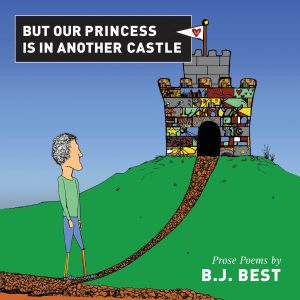You might expect this collection of prose poems—whose puns, extended metaphors, and multiple-purpose generalizations string together the story of the author’s life, from childhood to fatherhood, by way of sixty-three video games—to be a sweet exercise in old-school nerd nostalgia. (“Frogger,” for example, concludes: “Some things are too dangerous to cross.”) And yet B. J. Best gathers his power not from nostalgia, not from the mere contrast between a kid’s joys and a grown-up’s cares, but from a deeper dichotomy. Most video games, from Pong to Grand Theft Auto by way of Donkey Kong, have clear rules and in-game goals, along with clear consequences, however cartoonish, silly, or amoral, for the actions we take. We know, in a game, how to get points and what to do next; we may be rewarded with a high score (Best entitles his valedictory poem “Congratulations, Enter Your Initials”). Life, however, has no such clarity. So to follow Best through these poems about games is to watch him come to terms with the difficult, helpless, undirected shapelessness of our grown-up, analog lives.
Along the way, each game provides its own wild symbols and comically appropriate extended metaphors. “Breakout” connects that frustrating paddle-and-ball game, with its frangible rainbow of bricks, to Noah and Genesis 9:8–17: “What did he think, when he saw that rainbow? That it was the mouth of God come to devour him, frowning at all his failures?” “Joust” considers the absurdity of human lives organized around competition—in elite education, for example—by likening them to the lives of ostriches raised as steeds for tournament-mad knights: “It is the highest ostrich honor to be martyred. But most wind up flocking to the coast to convalesce: tail feathers bruised as an oil slick; a broken claw hanging from a toe, bugling its song of pain.” The poems would not work as wholes if their sentences did not work as shapely, consecutive parts: fortunately Best has a terrific—and somewhat Romantic, melodic—sense of sentence shape and sound, moving from sweeping propositions into cute lists (“little monkey-faced, sweet-muffin, jumping-bean babies of mine”), into regular metrics and out again.
Best joins other contemporary poets dependent on comic books, comic strips, or low-budget genre films (Ray McDaniel’s Legion of Super-Heroes, Monica Youn’s Krazy Kat, Katrina McGlynn’s or Daphne Gottlieb’s horror and slasher films) in proposing that pop-cultural stories take over the work...
You have reached your article limit
Sign up for a digital subscription and continue reading all new issues, plus our entire archives, for just $1.50/month.
Already a subscriber? Sign in





